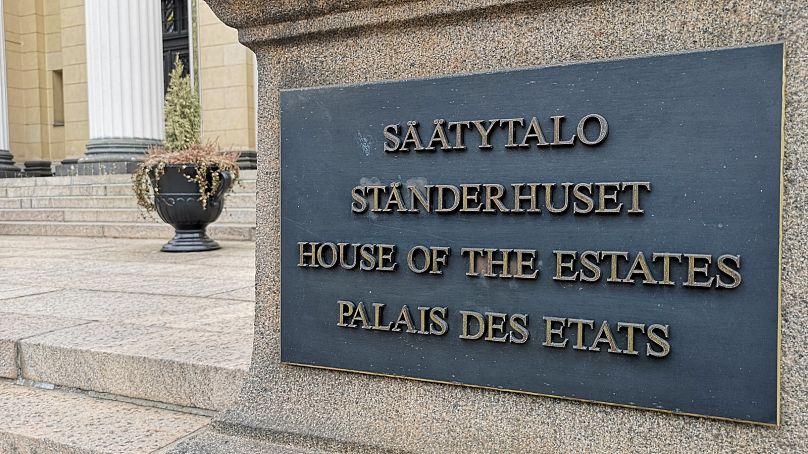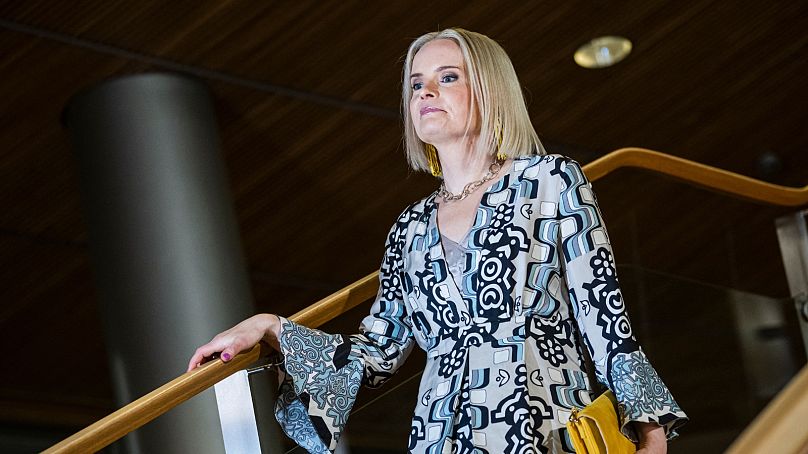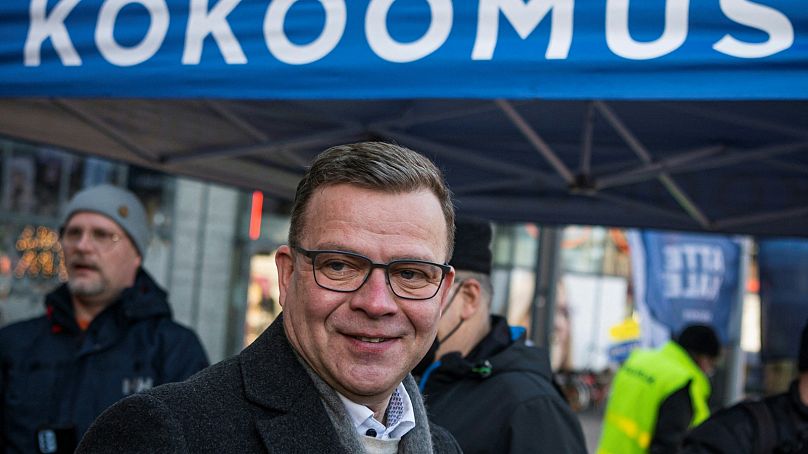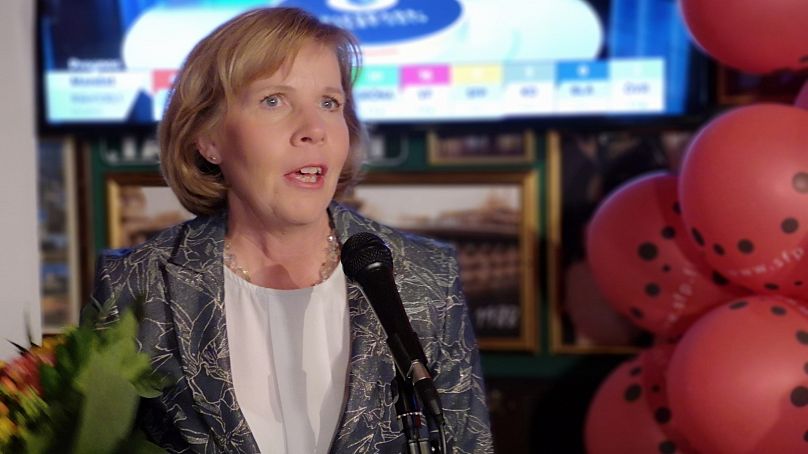After four weeks of fractious talks, the far-right Finns Party is insisting all other issues are off the table until progress is made - or not - on immigration and the environment.
While most of Finland was swept up by the country's rumbunctious Eurovision entry during May, inside the gilded rooms of the House of the Estates in Helsinki, talks to form a new government were plodding on, going nowhere fast.
Behind the stout wooden doors of this ornate building in the heart of the Finnish capital, hundreds of elected politicians, party officials, civil servants and experts have been toiling thanklessly to try and build cohesion among the four parties. These discussions have been riven by fractious quarrelling, finger-pointing and even gaslighting in social media spats.
The main culprits have been the far-right Finns Party, who seem to hold the upper hand at the moment. This week they demanded that discussion on all other matters except immigration and the environment be put on ice. Their rationale: if the right-wing National Coalition Party (known locally as Kokoomus) which won April's general election, and the smaller Swedish People's Party SFP/RKP capitulate on these biggest roadblocks, then they'll have scored a huge win. Plus the rest of the programme for the next four years of government will be much easier to negotiate.
"I think that it was to be expected that there would be some heated discussion especially between Finns Party and RKP/SFP representatives, since these are the two negotiating parties with probably the biggest ideological differences; especially when coupled with a populist style of politics and political communication from the Finns Party's side," explains Jenni Kärimäki, a researcher in political history at the University of Helsinki.
Kärimäki tells Euronews that it's also no surprise the relatively inexperienced cohort of Finns Party politicians didn't change their usual style of communication, airing their dirty laundry on social media, rather than keeping the discussions private.
"Many of them have a sizable amount of followers online and they will continue to speak to that audience regardless of their status as MPs of a government negotiating party. Keeping in touch with one's supporters is crucial if one wishes to be re-elected by the same online audience in four years," she said.
Negotiations among adversaries, not allies
Finnish politics watchers say these government negotiations are some of the most perplexing they can remember in recent history. This is because the three parties which could form the crux of a new government, are simply incompatible across so many policy areas on paper.
While Kokoomus leader Petteri Orpo has been credited for his steady stewardship of the talks, he seems to be pinning all his hopes of forming a government on getting the far-right Finns Party to soften their stance on immigration - which their leader Riikka Purra has indicated just won't fly - as well as on areas of EU policy and fighting the climate crisis.
There's also a gulf on a range of other issues including how to tackle the government's sizeable debt.
For now, the Swedish People's Party seem to be playing a game of political chicken to see who blinks first: either the Finns Party abandons their long-held red lines, or SFP/RKP would throw out their own values-based beliefs. The latter have shifted further left in the last four years as part of Sanna Marin's government, especially on immigration, international aid, fighting climate change, and keeping Finland very much a part of the international rules-based order.
If either side capitulates, it would be a political earthquake in the Nordic nation.
SFP/RKP in particular seem like the odd one out in this possible coalition. It's not difficult to find Finns Party MPs who are against compulsory Swedish lessons in all Finnish schools, or who think Swedish-speaking Finns - who make up about 5% of the population - are elites who traditionally hold too much power. And it's not hard to find fringe Finns Party supporters who don't even believe Swedish-speaking Finns are "real Finns" at all.
"I'm not surprised at all at the clashes, but almost dumbfounded to work out why the Swedish People's Party are still in the talks, and actually want to be in government with the Finns Party," says an SFP/RKP member and former ministerial adviser, who asked not to be named.
Is there a bigger political game at play?
So could the entire negotiations be part of a bigger game for either the Finns Party or SFP/RKP?
The Swedish People's Party, part of almost every Finnish government since 1980, were stung when they were left out of the three-party coalition government of 2015. They watched on powerlessly as institutions and programmes which underpin the status of the Swedish language in Finland were defunded or scrapped completely.
So they've gone into these negotiations, perhaps rather than be left out again - even as they faced a volley of nasty criticism from some Finns Party MPs gaslighting them for being a "small" party, one that does not deserve much say in the formation of a government in the first place.
If SFP/RKP pulls out of the talks the government formation very likely collapses, so in reality they do hold a lot of power.
"I think that Swedish People's Party leader Anna-Maja Henriksson really does mean it when she says we won't go into a government that does Finns Party politics. But I don't know how far she will bend that rhetoric in order to be able to fit in," says the SFP/RKP member, and former ministerial adviser.
"She wouldn't agree to stop taking immigrants entirely, but maybe instead lower the quota for cost reasons or something, there could be compromises she can live with ideologically," they add.
There's also an idea the Finns Party went into the negotiations with a list of cast iron demands and no real intention to soften their core positions so they can ultimately back out.
"The Finns Party can say we tried our best, we defended our values, and the others don't see it like this so we quit," explains Kimmo Elo, a senior researcher at Turku University's Centre for Parliamentary Studies.
"They can sell this to their voters as a victory. But what Petter Orpo fears a bit is that they could turn this into growing support among voters, especially if they are in opposition with the Centre Party."
And what about Kokoomus themselves?
The idea has been floated that they too, went into the negotiations hopeful the Finns Party would relent on their immigration stance, but knowing they might not.
"I think the most probable situation is if Orpo says it's not going to work with the Finns Party, they will replace them with the Social Democrats," says Elo.
"They would then have a traditional coalition and send a message to voters, lessons learned, it is not going to work with the Finns Party, as they cannot cooperate with other parties to form a workable majority coalition.
"The message is: you can vote for them but don't expect it to work with them in government," Elo adds.
What's the deadline for negotiations to end?
There are both internal and external pressures on the parties to get an agreement over the line sooner rather than later.
At this time of year, Finnish politicians want to get everything wrapped up ahead of Midsummer. It is almost inconceivable to imagine any politician sacrificing a weekend at the summer cottage, and the power of that holiday is a strong incentive to reach agreements.
There's also the European Council meeting happening at the end of June. Kokoomus will want to have a government team in place, with ministers and teams of advisers appointed, as a signal to Brussels and the rest of the European Union that Finland is open for business and working smoothly.
There's domestic pressure too. A recent poll showed only 8% of Swedish People's Party voters want to be in government with the Finns Party, and the pressure will build from their own supporter base. There are cracks already showing within SFP/RKP, with more than one of their MPs is taking part in the talks under duress.
"The people who are really upset are constituents. Many of the southern Finland MPs from the Swedish People's Party are going to have constituents and party members complaining if we go into government with the Finns Party. There is a lot of pressure on those MPs already," the SFP/RKP insider explains.
But it needs at some point proper and decisive leadership from Kokoomus leader Petteri Orpo. If the sides are still so far apart on big important issues and there's no moving forward, it could be time to call the death on this round of negotiations and then reconvene with a Plan B instead.
Then again, either the Finns Party or SFP/RKP could break first and give up their policy red line positions.
But if they went into government together big questions would be hanging over them whether they could last the course of the next four years as cooperative, productive stablemates.
















